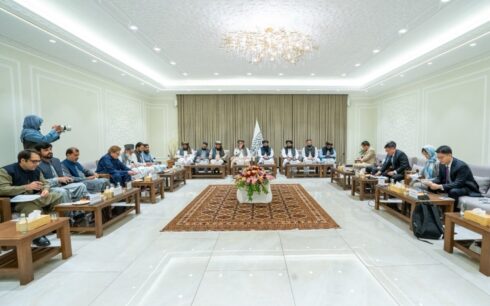WASHINGTON — The Federal Bureau of Investigation has removed a reward offer for the capture of Sirajuddin Haqqani, the interior minister of the Taliban, from its official website. Despite the change, Haqqani’s name remains on the bureau’s list of most-wanted individuals.
The development comes days after the release of George Glezman, an American citizen who had been held by the Taliban. Shortly after Glezman’s release, the State Department’s “Rewards for Justice” website also removed listings for Sirajuddin Haqqani and two other Haqqani network members, Aziz Haqqani and Yahya Haqqani.
The government of Qatar, which has played a mediating role in Afghanistan-related negotiations, said that U.S. Secretary of State Marco Rubio thanked his Qatari counterpart in a phone call for the country’s role in facilitating Glezman’s release.
“The U.S. Secretary of State expressed gratitude to the State of Qatar for its help in securing the release of an American citizen who was detained by the Taliban in Afghanistan,” the Qatari Foreign Ministry said in a statement. The statement added that Rubio also commended Doha’s broader efforts to promote stability and peace in Afghanistan and the region.
Glezman’s release coincided with a previously unannounced visit by a U.S. delegation to Kabul. The group included Zalmay Khalilzad, the former U.S. envoy for Afghanistan, whose presence in Kabul was described by observers as unexpected and without precedent since the Taliban takeover.
Images published from the scene of Glezman’s release show members of the American delegation, including Khalilzad, on location.
A quiet deal or a strategic gesture?
Two days after Glezman’s release, several individuals close to Sirajuddin Haqqani — including Anas Haqqani — said that the United States had removed a $10 million reward for Sirajuddin and $5 million rewards each for Aziz and Yahya Haqqani.
The U.S. government has not issued an official explanation for the decision, but it has fueled speculation about behind-the-scenes negotiations between Washington and the Taliban.
Ghulam Farooq Aleem, a former Afghan prosecutor, said the move may point to a shifting strategy by the United States.
“The killing of Ayman al-Zawahri in Kabul, the release of American detainees, and ongoing intelligence contacts all suggest that the U.S. may be offering short-term concessions to the Taliban,” Aleem said.
As of Tuesday, the Taliban leadership in Kandahar, along with the Taliban’s foreign ministry and presidential palace, have issued no public response to the removal of the reward notices.
Sources familiar with internal Taliban dynamics previously told Amu TV that Sirajuddin Haqqani’s 52-day absence from public life was due to tensions with the Taliban’s top leadership. Haqqani reappeared on March 13 at a mosque in Khost Province, but 12 days later, no official image has been released showing him at the Taliban’s Interior Ministry.





